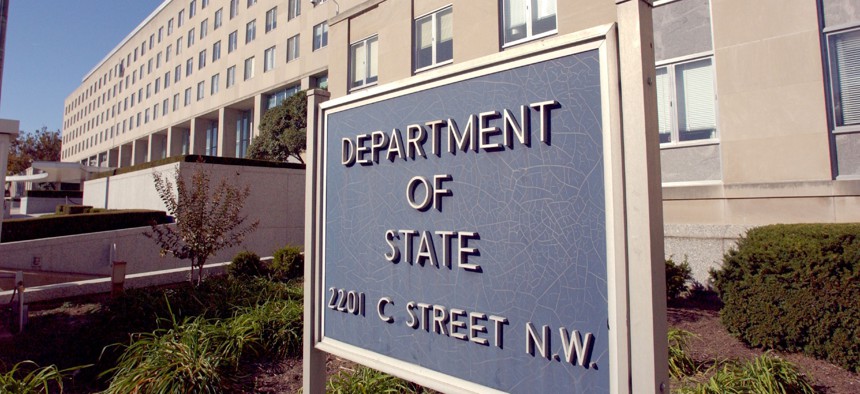
The laid off employees remain on the payroll, as they will sit on paid administrative leave through Nov. 8. They will now separate at a higher grade, provided the promotions go through before that date. Greg Mathieson / Mai / Getty Images
The State Department laid them off, then it promoted them
The department is sending a message that "even excellence cannot protect your career," union says.
Updated Aug. 27 at 5:52 p.m.
Every year, the State Department completes a thorough process involving multiple layers of review to determine who in the foreign service will get promoted.
For some of the employees approved for higher-ranked roles this year, the news came as a surprise: just a month ago, they were laid off by the department.
At least 10 individuals were promoted after receiving layoff notices in July, according to the American Foreign Service Association, which represents the workers. They worked in areas throughout the department, including a deputy assistant secretary in the Energy Resources Bureau and others in European and Eurasian Affairs, Economic and Business Affairs, International Narcotics and Law Enforcement Affairs and other areas.
State laid off 1,350 employees in total, 264 of whom were foreign service officers. It is shedding a total of 3,000 employees, including attrition and incentivized separations. The recent promotions are not expected to affect the layoffs.
“That the department would simultaneously recognize individuals for exemplary service and eliminate their positions as no longer needed defies logic,” AFSA said in a statement. “Together, these actions send a chilling message: In today’s State Department, even excellence cannot protect your career.”
State officials said ahead of the layoffs that the department’s reorganization was meant to “refocus” its mission on core objectives and modern needs. The department was not saying those impacted by the layoffs “weren't doing a good job or weren't valuable members of the State Department family,” one official said, but the administration had an obligation to “do what's right for the mission and what's right for the American people.”
“Headcount reductions have been carefully tailored to affect non-core functions, duplicative or redundant offices, and offices where considerable efficiencies may be found from centralization or consolidation of functions and responsibilities,” the department said in notice to staff on the day it sent RIF notices.
One State employee who was laid off and promoted this week said his experience "exposes the absurdity" of the reorganization. No private sector organization would fire people it has deemed worthy of promotion, the former foreign service office said.
"I took it as kind of ironic and an encapsulation of this whole exercise and the bad faith nature of it," the laid off employee said. "It was a performative firing of people for political purposes."
State determines promotions of foreign service staff with selection boards, who review the qualifications of the officers every one-to-four years after their last advancement. The department promotes around 1,400 foreign service personnel per year, according to a recent Government Accountability Office report. The undersecretary for management at State, a role currently filled by Jose Cunningham, must sign off on all the promotions. Cunningham helped oversee the reorganization efforts and the resulting layoffs.
Selection boards began their reviews before the layoffs and did not know who would be affected when making their recommendations. Cunningham and the State officials who signed off on those recommendations in recent weeks opted not to remove those who were laid off from the approved promotion list.
The laid off employees remain on the payroll, as they will sit on paid administrative leave through Nov. 8. They will now separate at a higher grade, provided the promotions go through before that date.
AFSA reiterated its call for State to reverse the reductions in force, saying the cuts are causing chaos throughout the department.
The Global Talent Management bureau, which oversees State’s promotion process, recently put out new guidance for determining whether employees should be promoted. It created a new section called “fidelity,” which will measure employees’ commitment to “zealously executing [U.S. government] policy” and “completely aligning oneself and one’s team to the most current [U.S. government] goals.” Employees expressed concern that the new standards would prohibit the tradition of constructive dissent and force selection boards to judge FSOs on their willingness to bend to political winds.
The new standards will go into effect for the 2025-2026 review cycle.
This story has been updated with additional comment.
Share your news tips with us:
Eric Katz: ekatz@govexec.com, Signal: erickatz.28
NEXT STORY: HHS the latest to cancel union contracts and implement Trump’s order







